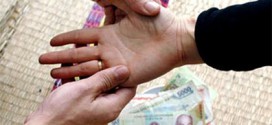In Vietnamese customs, there are a lot of superstitions related to the newborn baby after birth. These are some most common of them: the praise should not be given to the newborn baby; the pillow of the baby should have seven chunks of mulberry with a needle; and there is a one month celebration for the newborn baby on his 30th day.
According to the Vietnamese customs, you should never give the newborn baby a good praise because it could invite the attention of demon and ghosts. The baby’s health will not be good and he/she will cry much. If you want to say the baby is cute or good, you have to say it with the idiom “trộm vía” (steal soul) before you give the baby good appreciation. Mother should not say her baby is cute or He/She is very good at things. If you ask about her newborn baby, she will say it in the opposite ways with the idiom “trộm vía”.
Normally almost newborn baby cry much at night so Vietnamese believe that he/she scared about the new place. In order to avoid this situation, the mother uses seven chunks of mulberry and a needle to make an amulet and put it inside the pillow. After that the baby may not cry and could be very good. In Vietnamese belief, the amulet is to dismiss ghosts and make the baby sleep well.
Based on the Buddhist family, in the morning of the baby’s 30th day, sacrifices are offered to the gods so that the gods will care for the baby in his following life. Furthermore, in the morning of the baby’s 30th day, it is also the time to inform officially to all ancestors that the new member of the family so they will protect the newborn baby. On that day, several relatives and closed friends of parents are invited to have a small party. The purpose of the party is the chance for relatives and friends have a look at the newborn, pray for him/her a good life and give the newborn baby gifts.
There are some debates on those superstitions above but they still have been passing from generation to generation. Believe it or not, those customs still reflect the unique custom of Vietnamese daily life.
 Vietnamese Culture and Tradition
Vietnamese Culture and Tradition 

